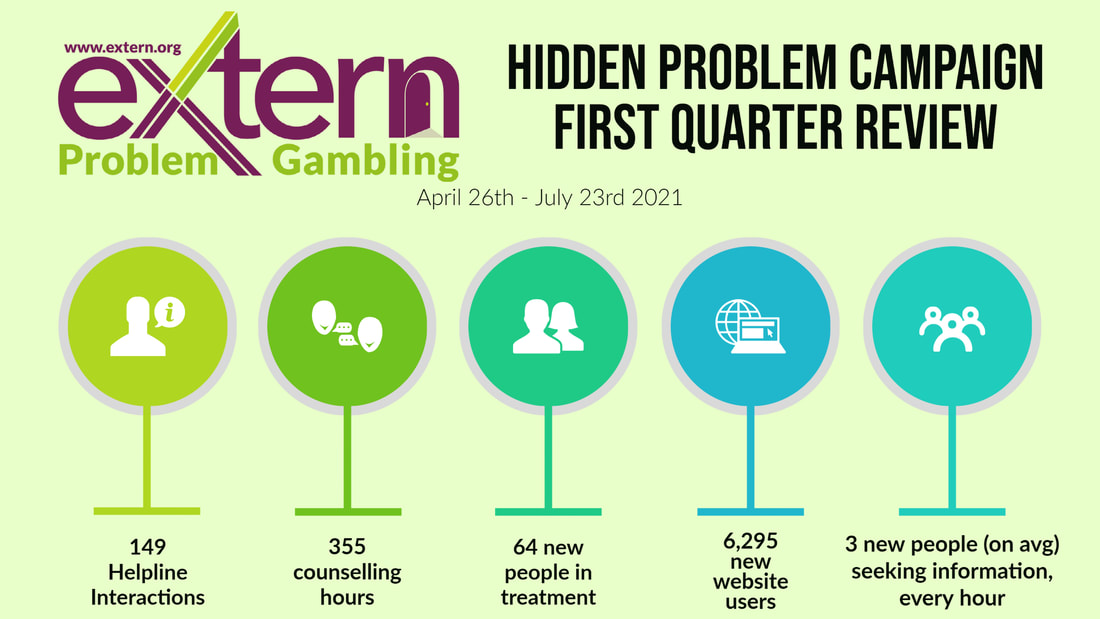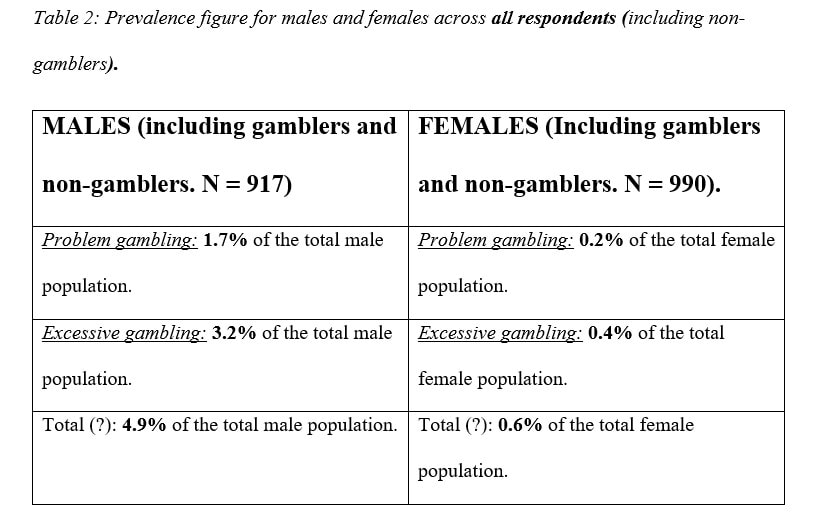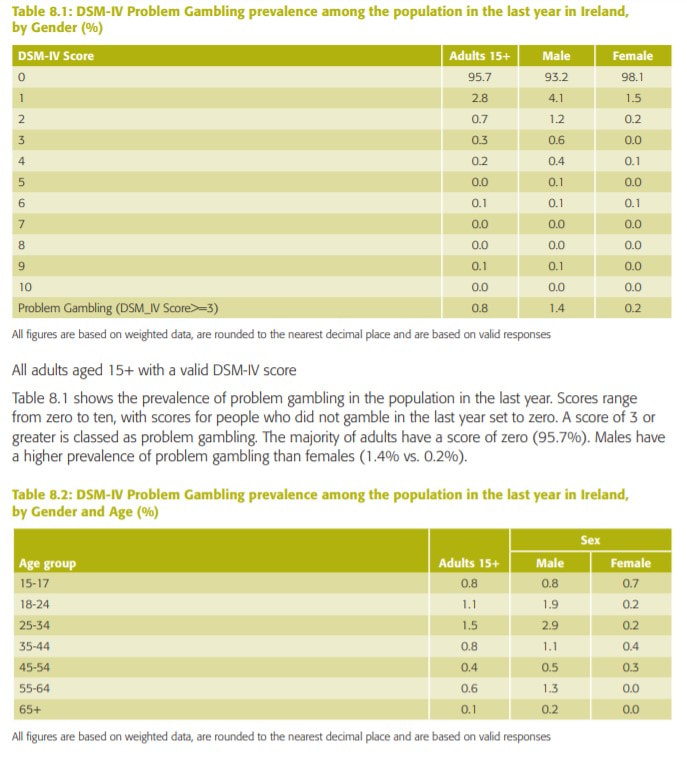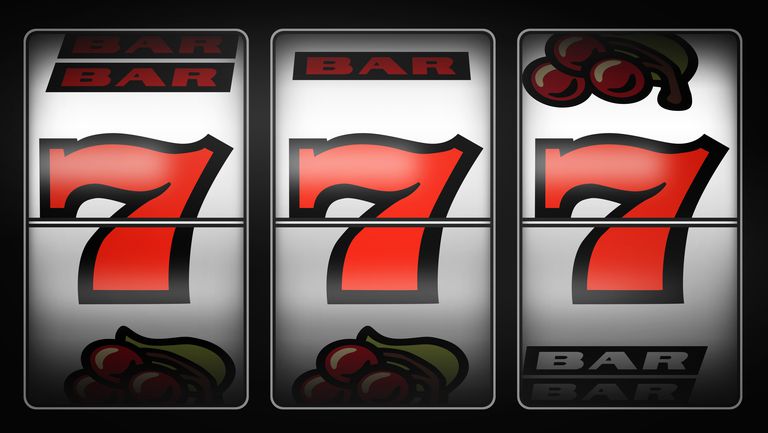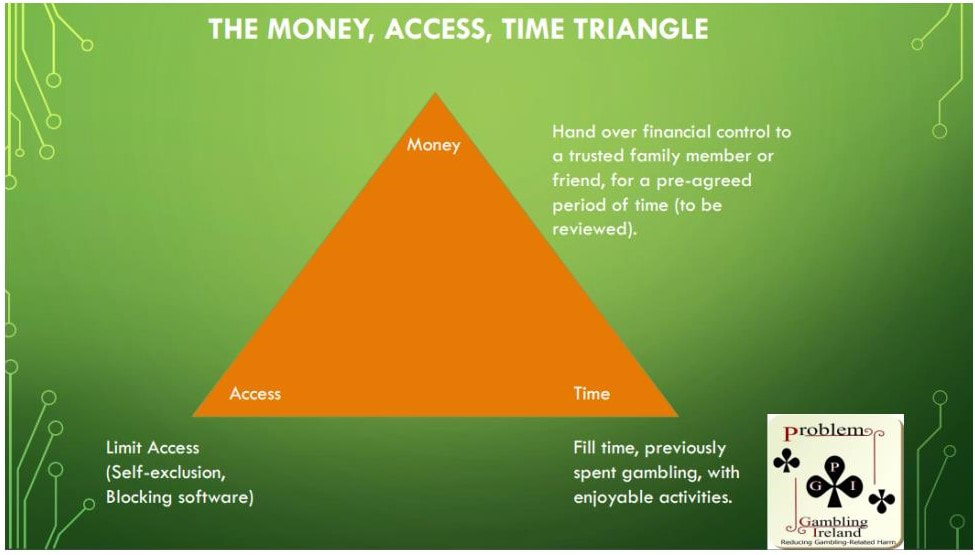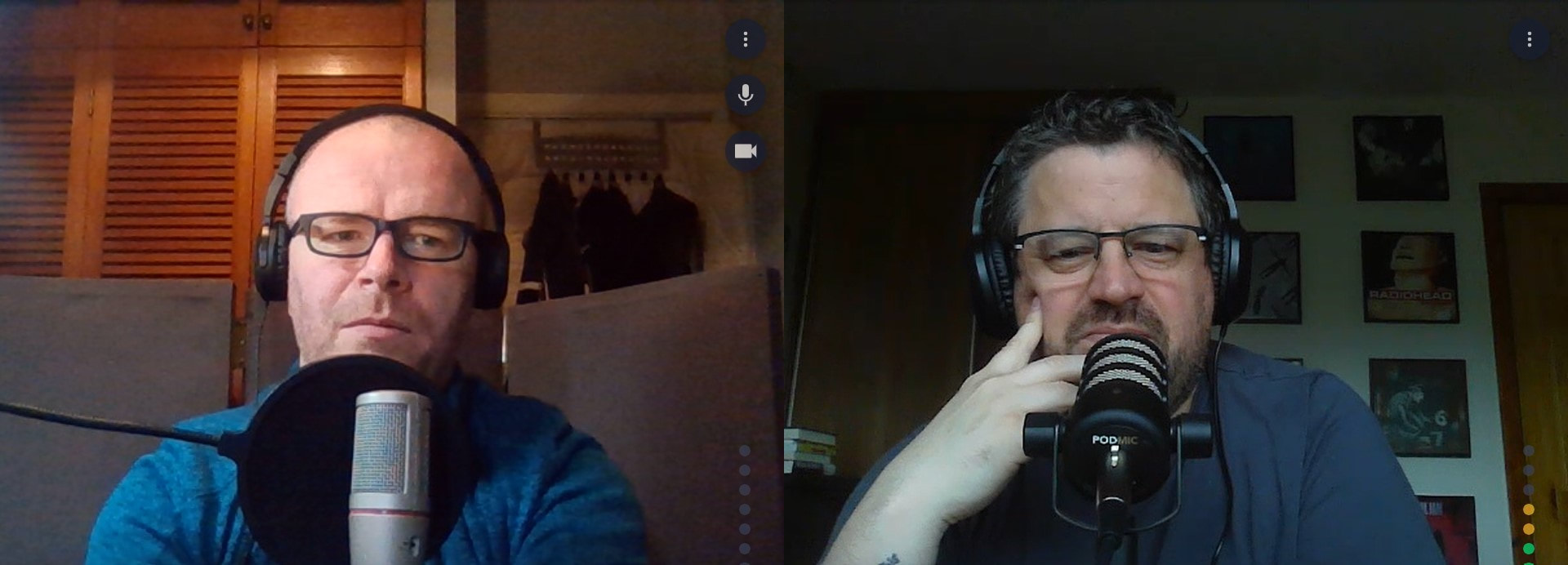|
We have received so much positive feedback from this interview with our team member, Tony O'Reilly, on the brilliant 'Talking Bollox Podcast'. Raising awareness in this way, gets more people seeking help and gets more people talking about gambling addiction and its causes - which helps to destigmatise the issue.
You can listen to the audio version of the podcast here, or watch it on YouTube.
0 Comments
While gambling addiction is often incorrectly viewed as a 'male problem', many women develop addictions to gambling. We are proud to have had three inspirational women in recovery on The Problem Gambling Podcast, so far and would love to hear from more women who want to share their recovery stories. This short clip from our interview with Stacey Goodwin, hits the nail on the head, regarding one of the most common fallacies which drives gambling addiction - the dream that a 'big win' will solve everything. If you want to talk to someone in confidence, about your own issues with gambling, or a loved one's - or avail of our free counselling service, please fill out the Contact Form and we will arrange a call. Listen to the full interview with Stacey (A.K.A. 'The Girl Gambler') Nadine Ashworth is in recovery from a gambling addiction and is a Peer Mentor at the NHS Northern Gambling Clinic. Jenna Makela is an Expert by Experience, working with a Finnish support service for people with gambling problems. Claire Donegan is an Expert by Experience and the CEO of Thrive Recovery Lisa Walker is an Expert by Experience and Outreach Worker with BetKnowMore On the 26th of April, this year, Extern Problem Gambling were proud to launch the ‘Hidden Problem’ campaign with the support of campaign ambassadors Oisín McConville and Niall McNamee. We were in a position to begin providing a free helpline and online counselling service to anyone on the island of Ireland. Backed by a large-scale awareness raising media campaign, we were inundated with calls and emails from people seeking help for themselves or for loved ones. In the first 3 months since the campaign launched, we have delivered:
Three-quarters of people seeking helpline supports sought them for their own gambling problem, while 1 in 4 people seeking helpline supports contacted Hidden Problem regarding a loved one’s gambling problem. 6,295 new users visited www.problemgambling.ie over the last 3 months. This is an increase of 64% compared with the same 3 month period in 2020. According to problem gambling prevalence data, there are roughly 60,000 people with gambling problems on the island of Ireland (~30,000 ROI and ~30,000 NI). On average, roughly 3 new people are seeking information on help for a gambling problem, from our website, every hour of the day. We are seeing a broad geographical spread of people accessing the website. As the service is delivered remotely, we can work with people anywhere on the island of Ireland. Raising awareness of problem gambling reduces stigma and increases help-seeking. This is so important when help-seeking rates are so low among people affected by gambling related harm. We will continue to raise awareness of the risks associated with gambling, as well as the supports available to anyone affected by a gambling problem - and encourage anyone who has any concerns about their own gambling, or that of a loved one, to make contact with the Hidden Problem service.
Send us a Text Message 0892415401 (ROI) 07537142265 (NI) or Email (contact form), if you would like to arrange a completely confidential phone call, or simply get information and advice via email or text. Most of the people who contact our service are interested in one thing: stopping gambling completely. The vast majority of people we work with have made numerous attempts to quit gambling and, unfortunately, relapsed. So, just like you, they have realised that they cannot gamble in a moderate or recreational way. Having an unhealthy/addictive relationship with gambling is not a problem - as long as you don't gamble. The real problem is repeatedly convincing yourself that you can gamble safely - when you have so much lived experience evidence to the contrary. Many people cannot have a healthy relationship with gambling - just as many people cannot have a healthy relationship with alcohol or other drugs. While the Government and Gambling Industry must take their fair share of responsibility for facilitating gambling addiction, they can't do your recovery for you (unfortunately). So, here are some tips for starting out on your recovery journey. While some of these are uncomfortable, I know from working with hundreds of people with gambling problems, that the people who do all of these are much less likely to relapse than the people who 'cherry-pick' the easier ones.
One of the biggest issues with problem gambling (Gambling Disorder/Compulsive Gambling/Pathological Gambling/Gambling Addiction) - apart from the fact that it clearly has way too many names - is the lack of understanding that exists about how a person can become addicted to a behaviour in the first place. Because there is no addictive substance, like alcohol or nicotine, involved - most people believe that stopping gambling should be as easy as steering clear of the Betting Shop or deleting a gambling app from your phone. The reality is that it's far more challenging and complicated than that.
So, I've boiled down some of the reasons why so many people develop problems with gambling, in an effort to demystify and simplify things.
Barry Grant: As a person working for an NGO, which advocates for safeguarding measures to be put in place to protect vulnerable adults and children from gambling related harm, I sometimes get the occasional snarky comment directed my way. It's often something along the lines of, 'Won't somebody please think of the children?!' - a much-used quote from the Simpsons. I respect everyone's opinions on these matters and I'm more than happy to debate my side of the street with anyone who is so inclined. I'm very comfortable with my pearl-clutching, bleeding-heartedness - as I witness, first-hand, on a daily basis, the devastation which a lack of gambling regulation and harm-prevention services has on individuals, families and the wider community. The vast majority of people who attend our gambling addiction treatment service, started gambling as children. Of all the massive gaps in problem gambling service provision, which I find utterly infuriating, the one that boils my blood the most, is the absence of any statutory intervention to "take appropriate measures to protect young people from gambling-related risks". The reason that last section is in quotes, is that it comes from the National Policy Framework for Children and Young People, 2014-2020 (Better Outcomes, Brighter Futures). The policy is in its final year and, to date, the only change which has the potential to have any positive impact on children and young people is the legislation enacted this year, which places an over-18s age restriction on Tote betting and on 'gaming' machines. Previously there had been no age limit at the Tote and 'gaming' machines (such as slot machines - the most addictive form of gambling) had an age limit of 16. Government has completely ignored its duty of care to young people, when it comes to gambling-related harm. We know, from the recent European School Survey (ESPAD) of 15-16 year old's in Ireland, that betting on sports or animals (horse and dog racing) is the most common gambling activity. This can only happen if gambling operators are failing to verify the age of their customers. We also know that when the Regulator of the Irish National Lottery performed a 'Mystery Shopper' test in July 2018, they found that over one-third of retail staff (37%) did not attempt to verify the young person's age. A recent PQ reply from Minister for Health, Stephen Donnelly, showed that the State has never funded any harm-prevention interventions for gambling addiction. In the recently released ESPAD survey, they looked at problem gambling among 15-16 year old's for the first time. While they did publish rates of problem gambling among those who gambled, they did not provide the prevalence rate, across all respondents. As I am terrible at maths and get nose-bleeds when it comes to statistics, I reached out for help. Doctoral Student, Conor Keogh (UCD) came to the rescue. Here are the headline figures from Conor's analysis of the ESPAD Survey (2019) and a comparison with the National Advisory Council on Drugs and Alcohol (NACDA) problem gambling prevalence rates from 2014/15:
Conor Keogh: It is firstly important to consider that the above figures are not a statistical aberration and are generally in line with trends that are being seen all over Europe. Indeed, the ESPAD results found that of all those respondents across the full European sample who had gambled in the last twelve months, around 5% of respondents met the criteria for problem gambling. This equates to a rate of around 1.4% across the total sample in Europe. As has been in the case in various previous research findings, the ESPAD report also points to a very prominent gender discrepancy that exists in respect to problem gambling. In every country surveyed in the ESPAD report, boys were more likely to be problem gamblers than girls (boys had an average of 29%, compared to 15% amongst girls). Going back to the Irish context, the 2014 / 2015 Drug Prevalence Survey carried out by the National Advisory Committee on Drugs and Alcohol (NACDA) was amongst the first prevalence surveys carried out in the country to gauge gambling behaviours across the population. The report estimated that 0.8% of the male population aged between 15 and 17 fit the criteria for being problem gamblers (based on the DSM-IV classification framework). For females of the same age bracket, the figure was slightly lower, estimated to be around 0.7%. Overall, male adolescents were more likely to have gambled at least once over the past 12 months (29.9%) compared to adolescent females (20.6%). The recently released ESPAD statistics surrounding underage gambling in Ireland paint a highly dangerous picture. The ESPAD survey report (which covers a wide range of adolescent behaviours including alcohol, drug, and technology use) suggests that the problem gambling rate amongst Irish adolescent males has in fact risen to 1.7%, compared to the 0.8% found in the NACDA report. This represents nearly a doubling of problem gamblers amongst this demographic. 15 – 16-year-old females were estimated to have a lower rate, estimated to be at around 0.2%. This is in line with the average across all age-groups in the female population (0.2%), based on the NACDA 2014/15 study. In line with the other European states, boys who gambled had a higher problem gambling rate (7.6%) than the girls who gambled (2.8%). Of the students who gambled in the last 12 months, 26.3% (around 1 in 4) felt they needed to bet and spend more, and 12.2% (around 1 in 10) had lied to those close to them about their gambling behaviours. In the UK, we see a similar situation. The Gambling Commission’s 2019 report that investigated gambling behaviour amongst 11–16-year olds found that 1.7% of this demographic fit the criteria for being problem gamblers. In terms of total figures, this means that approximately 55,000 children are classified as problem gamblers in England, Scotland, and Wales. In addition to this, another 2.7% presented as being ‘at-risk’ gamblers, presenting with signs that they could be at risk of developing a more serious problem. Overall, 39% of the full cohort of respondents aged 11 – 16 have admitted gambling with their own money recently, with the most popular form of gambling being fruit machines at arcades and pubs (incidentally, slot machines were the least favoured form of gambling amongst Irish adolescent gamblers, according to the ESPAD data). Gambling amongst adolescents: new forms of gambling Decades of technological advance have meant that gambling has spread into various diverse forms of media, which has meant that the lines which demarcate what exactly constitutes “gambling” have become blurry in recent years. Such recent technological advancements have meant that gambling can be seen in increasingly common places, exposing children to it on a very regular basis, via television, mobile phones, and increasingly, in video games. One of the most notable places we can see this is through the increasingly popular “loot boxes” in video games. Indeed, recent research published by Central Queensland University found that of the 82 best-selling video games available, 62% (51 of them) had loot box mechanisms in them. For example, “FIFA packs” (as one example of many more) have been a notable demonstration of the muddied definitional lines between what is a harmless, fun feature of a game, and what is considered gambling. In many ways, the process of opening a pack (or any other similar loot box) is very much psychologically akin to a gamble and involves stimulating the brain in the same way that any other gamble does. As Macdonald (2018) says; “the dopamine hit is enjoyable, but potentially addictive, and hard to resist”. Whilst technically the reward being received by the player is not physically tangible (one might ‘pack’ a Lionel Messi in FIFA, yet this Messi has little to no value outside the game world), the overarching mechanism remains the same – it is a game of chance, of risk and reward, and is ultimately psychologically akin to real-life gambling that provides a “‘ripe breeding ground’ for the development of problem gambling among children”(Drummond and Sauer, 2018). In a recent Oireachtas report, Hurley (2020) mentions that at the time of writing, Ireland does not have a “gambling regulator, a digital safety commission or any other independent expert body responsible for determining whether loot boxes ought to be regulated as a form of gambling” and argues that there is a “growing consensus” that such regulation is required in Ireland to regulate for such practices. For many adult problem gamblers, their first exposure to gambling was in childhood. Testimonies from gamblers tell us that this first exposure can range from anything like buying a scratchcard, betting on the Grand National, sneaking into a casino, or perhaps playing cards with friends. Now, the number of opportunities available to would-be adolescent gamblers is enormous. This, combined with a very-liberal approach to gambling advertisement (noticeably during live sports), a prominent “gambling culture”, and the emergence and popularisation of gambling-simulator type practices in more common forms of media (such as video games), has led to a situation where children and adolescents have become at great risk to the harms associated with gambling, and the recent ESPAD statistics are a distinct testament to this. Problem gambling comes with a devastating personal, economic, psychological, and social cost. The figures that we see here from ESPAD are a result of an industry that has been continually under-legislated for in Ireland, and are a stark indictment of the Government’s failure to implement any meaningful legislation or solutions in order to counterbalance the devastating personal, financial and social cost of a gambling addiction. They also act as a timely reminder (and warning) that not enough has been done to protect children and adolescents from the harm associated with gambling, and that there is an urgent need for the development and implementation of proper channels of gambling prevention education, support, and treatment in Ireland, along with re-emphasising the urgent need for across-the-board legislation. NACDA Problem Gambling Prevalence Survey 2014/15
7 years ago, today, on the 15th of July 2013, the Heads of the Gambling Control Bill were published by the Fine Gael-lead government. The Heads of Bill outline a progressive piece of legislation, which has the potential to put in place fit-for-purpose legislation and regulation of gambling in Ireland, as well as creating a 'Social Fund', which would provide financial supports for problem gambling treatment, prevention, education and research. It saddens me greatly that we are here, 7 years later, with no enactment of the Bill and no Gambling Regulatory Authority in place.
To put this 7 year duration into context, the Public Health Alcohol Bill holds the current record for the longest interval between the publication of a Bill and its enactment - at 3 years. It was one of the most lobbied against Bills in the history of Irish legislation, by one of the strongest lobby groups in the country - the alcohol industry. In the absence of fit-for-purpose legislation and regulation, we see what the outgoing Minister of State, with responsibility for gambling legislation, David Stanton, called a 'Wild West' environment. In any unregulated sector, with unenforced and, often, unenforceable legislation, you will inevitably see a 'race to the bottom'. Just as in other jurisdictions, unscrupulous gambling operators, in Ireland, prey on vulnerable people for profit. In March of this year, Betway received a fine of £11.6 million from the UK Gambling Commission for failings linked to so-called 'VIP' customers. In February of this year, Mr Green received a fine of £3 million for 'regulatory failures', including Anti-Money Laundering and Social Responsibility breaches. In July 2019, Ladbrokes/Coral received a fine of £5.9 million for 'past failings in anti-money laundering and social responsibility'. In October 2018, Paddy Power/Betfair paid a 'penalty package' of £2.2 million for 'social responsibility and money laundering failures on its gambling exchange'. All of these companies provide gambling services, either online or land-based, in Ireland. It would be naive in the extreme to assume that they are better behaved in the unregulated Irish market, than they are in the regulated UK one. Just over 9 years ago, it came to light that my colleague, Tony O'Reilly, had stolen €1.75 million from his employer, An Post, and gambled every cent of it. The vast majority was put through his Paddy Power account. At no point did Paddy Power staff make any effort to intervene on the basis that Tony clearly had a severe gambling problem - which they were uniquely placed to identify. Nor did anyone from Paddy Power ever inquire as to the source of the astronomical funds which a post office manager was gambling. Instead, Tony was given the 'VIP' treatment and given tickets to race meetings and football matches. This is what an unregulated gambling market looks like. There were no sanctions brought against Paddy Power for Tony's case. Over the last 7 years of inactivity by the Irish Government, we have seen:
In March 2019, then Taoiseach, Leo Varadkar, stated that a Gambling Regulatory Authority could take up to 18 months to establish. This would give a timeline of September 2020. While Covid-19 has, no doubt, impacted on that timeline, it is reasonable, after a 7 year wait, for the people of Ireland to expect urgent action. If you are reading this and are sick and tired of the gambling industry in Ireland being unregulated, or if you wish to see funding directed towards treatment and prevention services, please contact your local TD. A list of contact details is available here: https://www.whoismytd.com/ The silent addiction cannot become the forgotten addiction. The time for action is now - not in another 7 years time. Barry Grant, Addiction Counsellor & Founder, Problem Gambling Ireland [We discuss this issue in more detail, in this week's episode of The Problem Gambling Podcast.] Today, I wrote to the members of the Fine Gael, Fianna Fail and Green Party negotiating teams, to ask that they ensure that Gambling Regulation is part of the new Programme for Government.
"I am writing to you, as a member of [your party's] negotiating team, to ask that you and your colleagues please ensure that the establishment of a Gambling Regulatory Authority is part of the new Programme for Government. Both Fianna Fail and Fine Gael have committed to this in their manifestos. A Gambling Regulatory Authority would be self-financing, through licence fees, fines and levies. As such it would place no additional burden on the Exchequer, during these challenging financial times for our country. Any set-up costs could be recouped, over time, through (for example) any fines levied on gambling operators. There are between 30,000 and 40,000 people with gambling problems in Ireland. It is estimated that, for every person with a gambling problem, an additional 8-10 people are adversely affected. The HSE stated that they only worked with 230 people with gambling problems in 2019. This is only the tip of the iceberg. Our free counselling service, in Waterford and Dublin, which launched in July 2019, worked with 98 people in its first 6 months of operation (with just two counsellors). At the start of lockdown we had over 50 people on the waiting list for Dublin. A Social Fund - a mandatory levy on industry turnover – as outlined in the Heads of Fine Gael’s Gambling Control Bill, would fund urgently needed treatment, prevention and research in the area of problem gambling. Research from other parts of the world has shown a massive increase in online casino gambling, during the Covid 19 lockdown. This is a far more addictive form of gambling and, as such, we expect to see an increased need for supports in the coming months and years." Barry Grant, Founder - Problem Gambling Ireland
In this episode of the podcast, we look at the starting point for anyone wishing to stop gambling. We cover the key areas of Access (self-exclusion), Time (what to do with your free time and to distract yourself from thoughts about gambling) and Money management. We discuss the challenges that come up for our counselling clients, as well as the advantages to having this control measures in place. The podcast is also available on Spotify and Google Podcasts.
Episode 1 of a new podcast, aiming to explore a wide variety of topics, surrounding problem gambling and gambling related harm. Presented by Tony O'Reilly and Barry Grant, this is an awareness raising project of registered charities, Problem Gambling Ireland and Extern. Barry Grant is an addiction counsellor and the founder of Problem Gambling Ireland. Tony O'Reilly is an addiction counsellor, author and expert by experience. In this first episode we discuss Tony's lived experience of addiction and recovery.
If you would like to send us any questions or ideas for discussion topics in future episodes, just email info@problemgambling.ie, in complete confidence. Also available on Spotify. |
|
